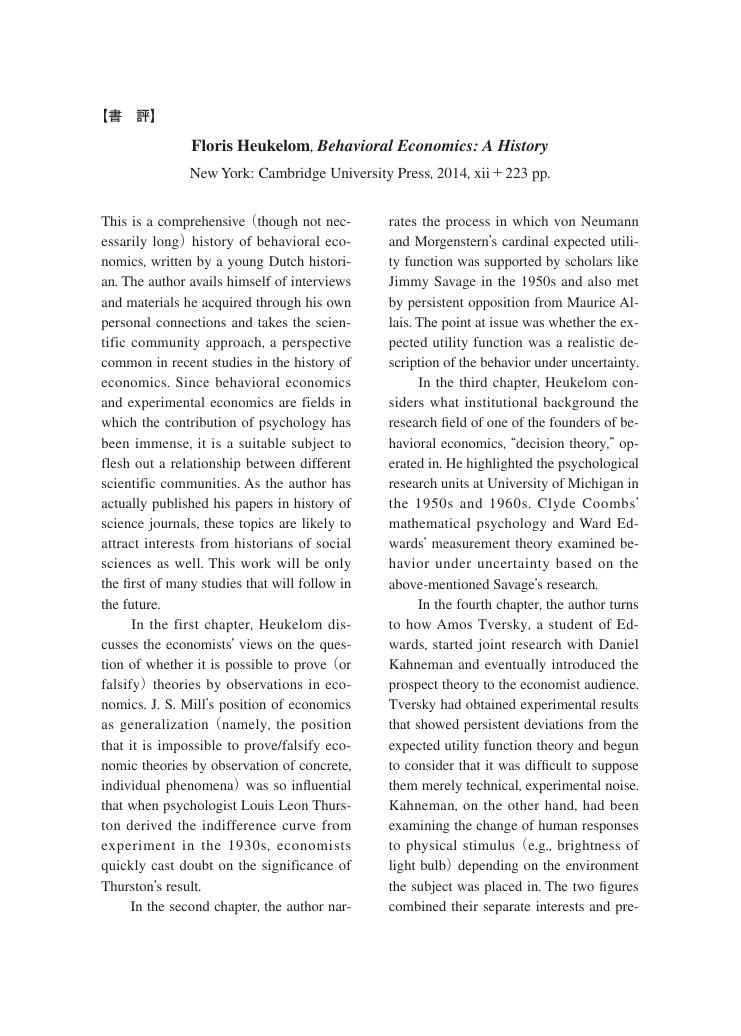1971年に公刊された『正義論』に端を発するジョン・ロールズの正義論は、いまなお自由、平等、そして民主主義をめぐる多様な研究の重要な基軸である一方、刊行から半世紀近くを経て、それ自身が一つの歴史になりつつある。本研究は、ロールズの正義論について、現代政治哲学における最先端の研究と、政治思想史や経済思想(史)からの歴史的な再定位を結びつけることで、「平等かつ自由な社会とは何か」というロールズの最も根源的な問いに答えることを目指す。この作業を通じて、政治哲学と政治思想史、さらに経済思想(史)研究の研究者のプラットフォームを作り、21世紀のリベラルな民主的社会のあり方を考察する。
- 著者
- 高見 典和
- 出版者
- The Japanease Society for the History of Economic Thought
- 雑誌
- 経済学史研究 (ISSN:18803164)
- 巻号頁・発行日
- vol.61, no.1, pp.94-103, 2019 (Released:2019-10-01)
- 被引用文献数
- 1
- 著者
- 高見 典和
- 出版者
- The Japanease Society for the History of Economic Thought
- 雑誌
- 経済学史研究 (ISSN:18803164)
- 巻号頁・発行日
- vol.56, no.2, pp.129-130, 2015 (Released:2019-11-30)
- 著者
- 高見 典和
- 出版者
- 経済学史学会
- 雑誌
- 経済学史研究 (ISSN:18803164)
- 巻号頁・発行日
- vol.56, no.1, pp.126-128, 2014 (Released:2019-08-24)
1 0 0 0 OA 欧米での科学社会論を用いた経済学史研究
- 著者
- 高見 典和
- 出版者
- 経済学史学会
- 雑誌
- 経済学史研究 (ISSN:18803164)
- 巻号頁・発行日
- vol.55, no.2, pp.109-115, 2014 (Released:2019-08-23)
- 著者
- 高見 典和
- 出版者
- 経済学史学会
- 雑誌
- 経済学史研究 (ISSN:18803164)
- 巻号頁・発行日
- vol.53, no.2, pp.130-132, 2012 (Released:2019-10-31)
- 参考文献数
- 2
1 0 0 0 OA 初期ピグーの労使関係論
- 著者
- 高見 典和
- 出版者
- The Japanease Society for the History of Economic Thought
- 雑誌
- 経済学史研究 (ISSN:18803164)
- 巻号頁・発行日
- vol.48, no.1, pp.78-92, 2006-06-30 (Released:2010-08-05)
- 参考文献数
- 20
In this paper I examine how Arthur C. Pigou (1877-1959) approached the problem of industrial relations in his Principles and Methods of Industrial Peace (1905) and other early writings. Pigou's discussion of the issue centered on the historical, theoretical, and normative dimensions. First, examining history, he argued that the labour movement in Britain first passed through three stages-violent, political, and economic-before it was possible to establish a peaceful system of negotiation between trade unions and employers' associations. Pigou attributed this achievement to strong and well-organized labour unions; realizing how costly it would be to continue fighting the trade unions, employers finally agreed to meet and talk with them. Second, Pigou's theoretical approach employed the theory of bilateral monopoly to identify a “settlement locus” and an “arbitration locus, ” which describe acceptable areas of bargaining between trade unions and employers' associations. Strong, well-organized unions, he concluded, were favorable to industrial peace. Third, Pigou's normative argument centered on the effects of trade unions on social welfare, as well as on industrial peace. He contended that strong unions pushed wages higher than the market rate, and so even though trade unions might function to promote industrial peace, they could also diminish social welfare. It was Pigou's belief that the negative effects of trade unions could be prevented by government policies; by artificially increasing the cost of conflict between trade unions and employers, government could create conditions to insure that industrial peace was compatible with maximization of social welfare. Too-forceful government intervention, however, would hinder employer-employee relations. Pigou therefore recommended moderate policies that could be used with flexibility. In conclusion, I discuss the basis for Pigou's belief that strong trade unions were necessary-rather than harmful-for industrial peace.




